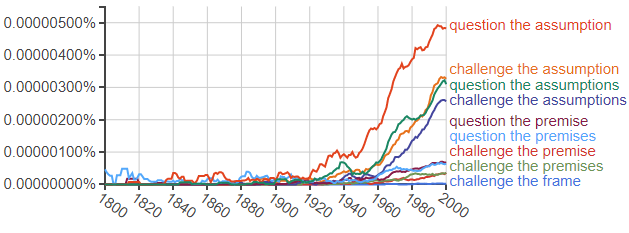The concept of a frame challenge is fairly ubiquitous in our community, at least for meta users or those who've been around long enough to have seen it a few times.
There's an issue here though: I'm pretty sure nobody else uses that terminology but us. All the results on Google or DuckDuckGo for "frame challenge" or "challenge the frame" (both DuckDuckGo links) bring up photo/art design challenges, and Google NGrams barely even recognises the existence of one formulation of the phrase and has no records of the other formulation. That makes it internal technical jargon that's primarily only meaningful to us.
This would be a non-issue except we use this technical jargon in answers written primarily not for us, but for the broad internet community arriving here from links on Reddit, forums, or Google. We up-front announce we're challenging the frame or making a frame challenge, and only a few hundred people inside our own community would understand what on earth that means. We're not writing these answers just for our insular community — others should be able to understand what they mean without having to ask us about our own jargon.
Is there a more ordinary colloquial English phrase we could use to describe this stuff we call frame challenges? If there isn't just one phrase — maybe what we call "frame challenges" is more a bucket of lots of different things — are there a few such phrases or expressions we could use to describe these things we currently call frame challenges?
I ask this because I'd like us to migrate away from calling these frame challenges, and instead start calling them ... whatever it is people usually call these things in English.
(This isn't a diamond moderator thing, just an invested citizen thing.)

